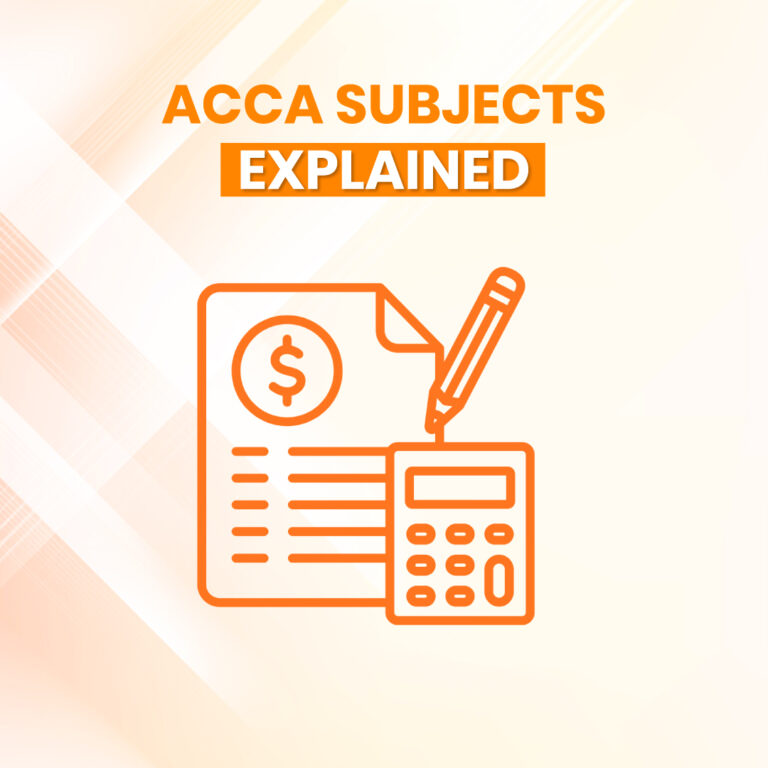“THE COMPLETE ACCA SYLLABUS BREAKDOWN; LEARN CONFIDENTLY, SUCCEED EFFORTLESSLY!”
ACCA has a well-defined, structured, and comprehensive curriculum; the ACCA syllabus is unlike other traditional qualifications, as it is detailed and covers a wide range of diverse accounting and finance areas. Despite covering a variety of topics, the standard of academic content remains high; ACCA is well-focused on not only preparing aspirants with theoretical concepts but also equipping them with skills to face the practical world. The curriculum, course content, and exam structure of all of the ACCA subjects reflect that, along with theory, it prioritizes skills as well. The competitive exams of ACCA testify to your knowledge and skills to manage a practical financial situation; this proves that the candidate is capable enough to step into the practical world.
The diversity of ACCA subjects ranges from fundamental areas to complex financial concepts; the total number of modules included is thirteen. These thirteen subjects are further classified into three different levels (Applied Knowledge, Applied Skills, and the Strategic Professional), with each level, the complexity of the course content increases. Let’s dive in to find out more about these academic levels and subjects to get a better understanding.
BREAKDOWN OF ACCA SYLLABUS:
The syllabus is divided into three levels, each carrying a different number of ACCA subjects; all of these subjects differ from one another, as each focuses on a new area.
1: APPLIED KNOWLEDGE:
Starting from the basics, this level is the fundamental, foundational stage that is relatively easier than other academic levels. However, the subjects and concepts discussed in this level might be basic but hold great value; aspirants who don’t have clarity in fundamental concepts can never proceed to the next stage. This level consists of three modules, namely:
- Business & Technology (BT)
- Management Accounting (MA)
- Financial Accounting (FA)
2: APPLIED SKILLS:
It is the second academic level that is relatively challenging than the previous one; the modules in this level are more focused on developing practical skills. Clarity in concepts and principles taught in the previous level is essential to become an expert in familiarizing oneself with the skills. The Applied skills level consists of six ACCA subjects; each one of them is essential and different from the others. The names of these modules are as follows:
- Corporate & Business Law (LW)
- Financial Management (FM)
- Performance Management (PM)
- Financial Reporting (FR)
- Audit & Assurance (AA)
- Taxation (TX)
3: STRATEGIC PROFESSIONAL:
The last level is considered to be the most advanced and challenging level of the entire qualification; the modules in this level are very detailed and keenly focused on equipping aspirants with technical, analytical, ethical, and professional skills; it examines a student’s capability to assess, analyze, think, and suggest a solution to a practical financial issue through real-world scenarios and case studies. This level consists of four ACCA subjects, two optionals and two essentials; the optional modules allow students to choose a subject they are more interested in, offering a kind of specialization in their area of interest. The names of the essential and optional modules are as follows:
ESSENTIALS:
- Strategic Business Reporting (SBR)
- Strategic Business Leadership (SBL)
OPTIONALS: (Select any two of four)
- Advanced Audit & Assurance (AAA)
- Advanced Performance Management (APM)
- Advanced Financial Management (AFM)
- Advanced Taxation (ATX)
CONCLUSION:
The ACCA syllabus is indeed very comprehensive and covers a wide range of different topics, but the skills and knowledge offered by this qualification are exceptional. The structure of this accounting credential is commendable and valued in both the academic and practical worlds. The total number of ACCA subjects is thirteen, and the content of each one of them is up-to-date and relevant to the global financial industry. The qualification and subjects might seem challenging at first, but the career perks and privileges that it offers in the practical world make it all worth it. Therefore, if you are looking forward to becoming an expert in accounting or finance and have a success-driven career, you now know where to start.
FREQUENTLY ASKED QUESTIONS (FAQs)
Q1: How can I avail of Exemptions on ACCA exams?
Ans: To avail ACCA exemptions, one must fall in the eligibility criteria; if you have a relevant accounting, business, or finance degree from a well-recognized university, you might be eligible for multiple exemptions (the number of exemptions allowed depends on your academic history). You can check it by inserting your academic details in the Exemption calculator available on ACCA Global’s online portal.
Q2: Are there any other academic requirements for ACCA?
Ans: Yes, other than completing thirteen exams, aspirants are also required to gain 36 months of relevant work experience and complete the EPSM modules.
Q3: What are ACCA CPD requirements? Who needs to complete them?
Ans: ACCA CPD requirements are for ACCA members and not for students; once you become a member, every year you need to complete several CPD activities to maintain your membership status.





